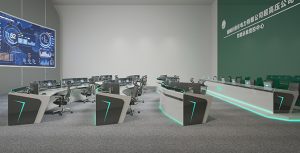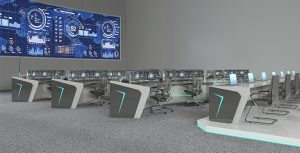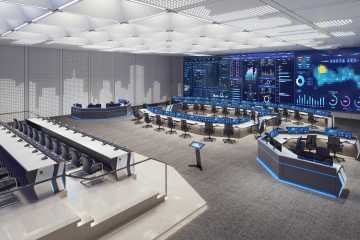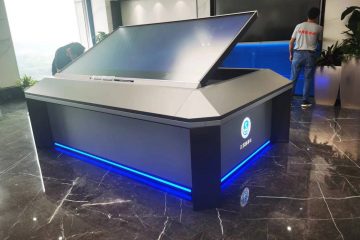With the continuous advancement of technology, the power industry is experiencing unprecedented changes. Especially under the impetus of smart grids, the management and operation methods of the power industry have undergone profound transformations. Among these transformations, the application and development of the command center control console play a crucial role.
The application of control console in the command center of the power industry mainly manifests in the following aspects:
Real-time monitoring and early warning:
The control console integrates advanced monitoring systems to Real-time monitoring the operation status of the power grid and equipment. Once abnormalities are detected, timely warnings can be issued to ensure the stable operation of the power system.
Dispatching and control:
Through the control console, dispatchers can achieve real-time dispatching and control of the power grid. Based on the operation status and requirements of the power grid, they can Rational distribution power resources to ensure the stability and reliability of power supply.
Emergency command and disposal:
In response to emergencies or power grid accidents, the control console can quickly retrieve relevant data and information to provide decision support for emergency command. Dispatchers can quickly issue dispatching orders through the control console, coordinate various departments for emergency response, and reduce accident impact.
Data analysis and decision support:
The control console has powerful data analysis capabilities and can perform analysis, mining, and prediction on power grid operation data. Through data analysis, it provides scientific evidence for decision-makers and supports decision-making and optimization.

During the development and design of the control console, certain principles and norms need to be followed to meet the actual needs of the power industry command center.
Specifically, the following are key considerations in the development process:
Reliability:
The control console must have a high level of reliability to ensure stable operation in complex working environments. Adopt high-quality hardware and software to ensure durability and low failure rates for the control console.
Scalability:
With the continuous development of smart grid technology, the control console should have good scalability. Design should consider future expansion needs for functional modules to facilitate upgrades and maintenance.
Human-machine interaction:
The human-machine interaction design of the control console is crucial. Emphasis should be placed on便捷性of operation, clarity of information, and visual comfort to enable dispatchers to efficiently complete their work. At the same time, designs that conform to human engineering principles can effectively reduce operational fatigue.
Safety:
Safety is of utmost importance for the control console, as it involves the stable operation and security of the power grid. Stringent safety measures such as data encryption, access control, firewalls, etc., should be implemented to ensure the secure and reliable operation of the control console system.
Intelligence:
With the development of big data and artificial intelligence technologies, intelligence has become a trend for control consoles. By introducing advanced AI technologies, intelligent monitoring, prediction, and dispatching of the power grid can be achieved, thereby improving operational efficiency and security for the power system.

In summary, the application and development of control consoles in power industry command centers play important roles in modernizing power industry operations and management. Through reasonable design and application, control consoles can enhance the stability, reliability, and security of power systems, providing strong support for the development of smart grids. In the future, with continuous technological innovation and advancement, the application of control consoles in power industry command centers will become more extensive and in-depth.



0 Comments